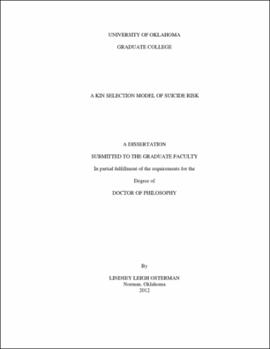| dc.description.abstract | Suicide has rarely been considered from an evolutionary perspective, likely because it appears prototypically maladaptive, and certainly appears to have no adaptive function. The current theory proffers a potential adaptive function of suicide: it might constitute a nepotistic response to pronounced resource scarcity. If this is so, conditions which maximize the adaptiveness of nepotistic behaviors (i.e., when direct fitness costs to the actor are outweighed by the fitness benefits bestowed upon the recipient; Hamilton, 1964) should facilitate suicidality. Controlling for a number of potential confounds, results indicate that individuals with large sibships, poor reproductive prospects, and economically deprived backgrounds are at higher risk for attempting suicide, and that information that might cue infertility (even erroneously) is positively related to suicide attempts among females. Discussion describes the ways in which these results support a nepotistic explanation of suicidality and a number of refinements and extensions that might be considered in future explorations of these ideas. | |
